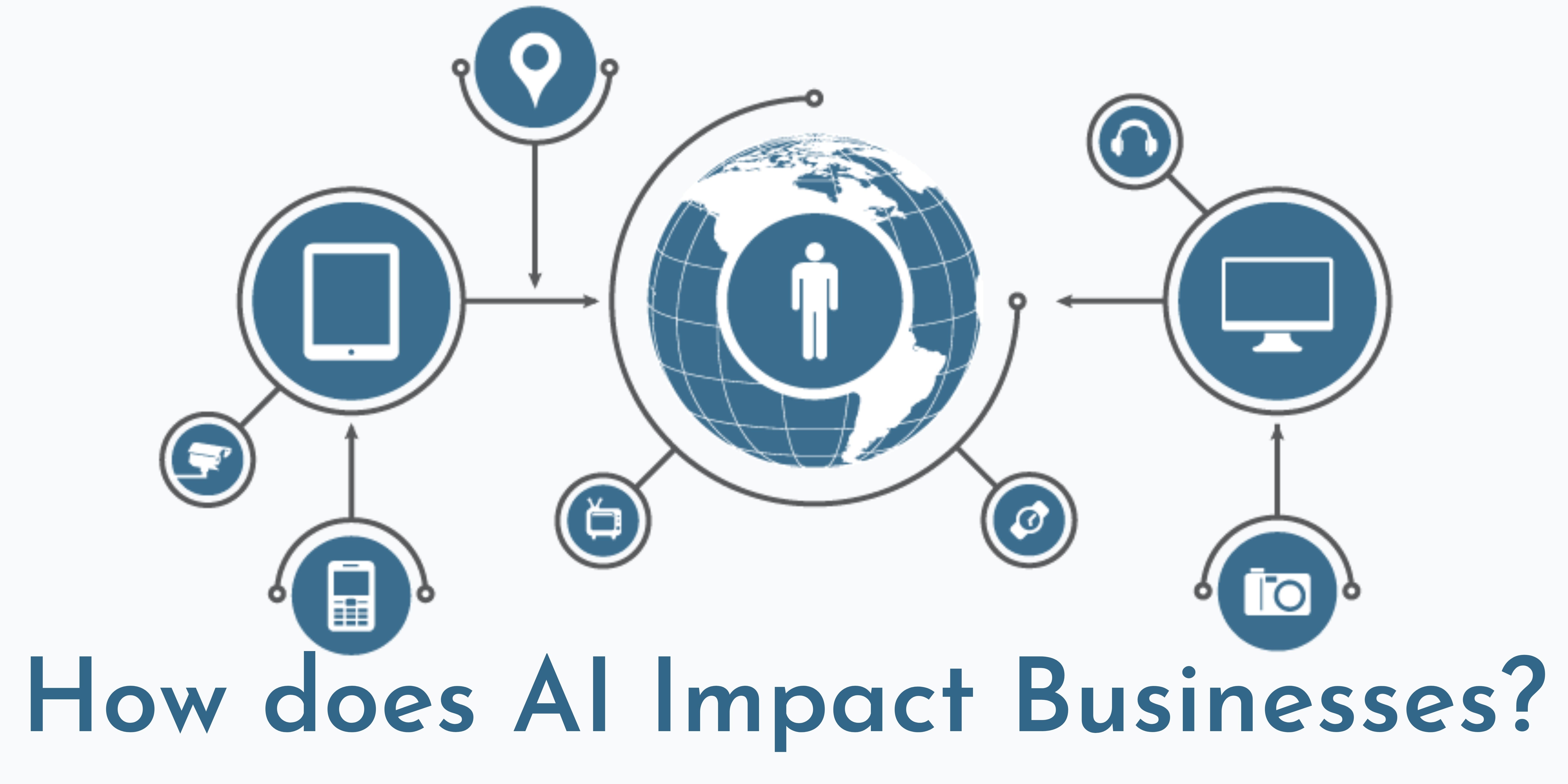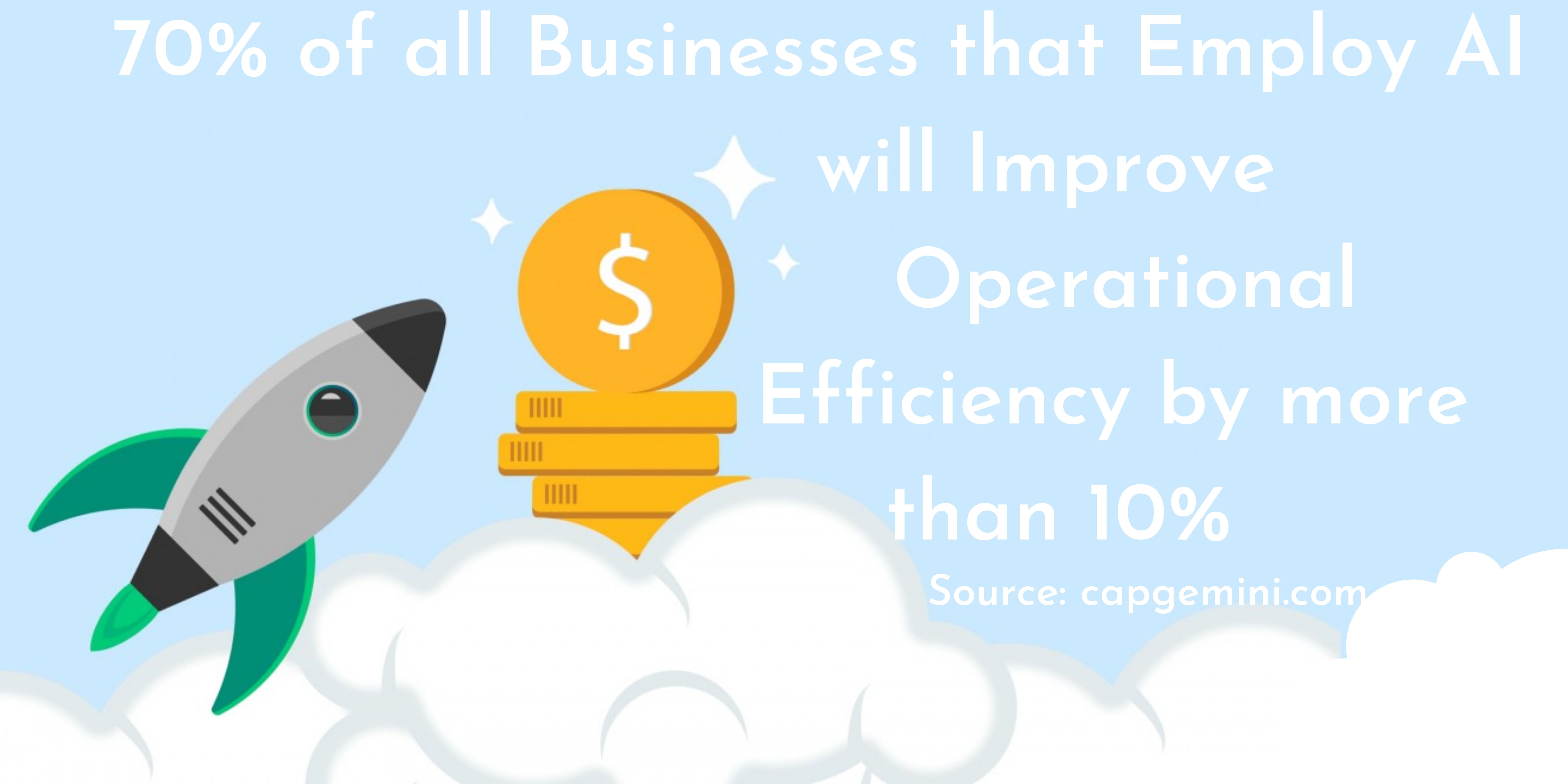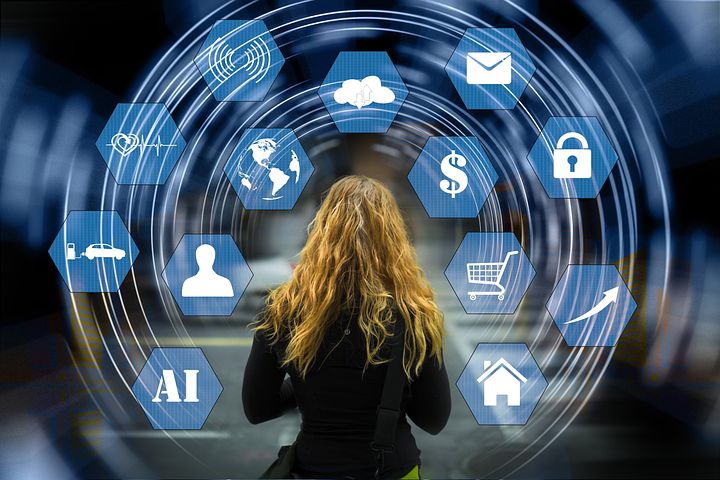AI has numerous benefits in many economic sectors. According to the 2020 Global AI Survey from McKinsey, technology accounted for over 5% of earnings before interests and taxes for 22% of companies. Additionally, AI-generated revenue in majority of business functions see a significant yearly increase. According to Infosys, AI-use offered businesses a major advantage over competitors.
From developing and executing marketing strategies to improving sales function, AI enhances various business functionalities, and helps save time and money while increasing operational efficiency.
Impacts of AI in Business

1. Real-time Assistance and Customer Service
Many businesses, such as airlines, need to be able to communicate with their customers in a timely fashion. AI can assist real-time customer support and communication, from sending personalized travel information to notifying passengers of delays. A positive experience during this time of communication is crucial. Many companies use AI to identify customer needs and deliver the best customer service accordingly. This is done while tackling associated problems and competing with other companies. Scaling to meet the needs of every customer is impossible without AI.
2. Profit Gain and Efficiency

The pace with which AI handles tasks on a massive scale is unmatched. While AI handles tedious work, humans can focus on more creative and collaborative tasks. This enables businesses to minimize costs related to performing mundane, repetitive tasks and maximize the talent of their human workers. AI can also result in shorter cycles of development. In other words, AI can help businesses move faster and cut down the time between product designing and commercialization. The shortened timeline can also aid in better Returns on Investment (ROIs).
3. Data Mining

The next benefit of AI in business is data mining. Cloud-based AI offers the advantage of quickly discovering crucial and admissible information while processing huge volumes of data. Businesses can use this to uncover insights that help them gain an advantage in the marketplace.
4. Brand Loyalty with Customization
According to Retail Customer Experience, over 60% of consumers expect personalization. This challenge comes in the form of heavy expenses, as customization takes time and money. In order to deliver, companies are required to map out consumer journeys and predict offers that will increase user engagement and drive sales. It is a colossal task, and AI can help.

Brands can use AI to predict what consumers will buy by analyzing data from previous purchases. Insights such as these allow businesses to deliver tailored content. AI can also be used to identify decision-making patterns and create consumer personas. Businesses can then drive specific content for each persona to better drive sales.
5. Expansion
Executives can expand by deploying AI in their business models. For instance, data analysis offers growth opportunities for businesses in different areas. According to a report by Marketing Platform, data-driven business strategies can increase company revenue by 20% and reduce costs by 30%.

A good example of AI-driven business expansion is autonomous vehicle companies utilizing data to open revenue streams in insurance. Autonomous vehicles remove the need for drivers. As a result, the insurance liabilities currently in place need altering and adjustments accordingly. The shift of liabilities and risks changes how vehicles are insured, changing the costs of insurance and creating opportunities for innovation.
6. Monitoring and Reduction of Human Error
Businesses can implement immediate monitoring capabilities with the help of AI and its ability to process massive sums of data in real-time. AI’s monitoring capabilities alert businesses of potential issues, recommending appropriate action and perhaps even initiating a response.
AI monitoring can also reduce human error and maintain established business standards. It does so by using available data to make decisions without emotions or opinions. While doing repetitive and mundane tasks, human workers are prone to making errors. In addition to automating and enhancing repetitive rule-based tasks, engineers can also train AI to improve upon itself and take on broader tasks as time goes on.
7. Talent Management
From rooting out corporate bias to streamlining the hiring process, businesses can use AI to improve various sectors of talent management. This not only saves hiring costs but also positively impacts workforce productivity. AI can successfully source, screen, and identify top-tier candidates, retain high performers and ensure equitable pay.

If you want to read more about why AI is the gateway to a future-proof career, have a look at this blog: 4 Reasons Why AI is the Gateway to a Future-Proof Career.
8. Predicting Outcomes
Another AI in business advantage is data-based outcome prediction. AI recognizes patterns in data, which businesses can use to determine how likely it is that a product will sell and in what volume. AI can also predict product-demand falls, helping companies purchase the right stock in correct volumes.
9. Optimize Logistics
Big data-driven AI applications streamline logistics on a large scale. It does so through AI-powered image recognition tools, among other processes. Such tools can help in the monitoring and optimization of business infrastructures, planning transport routes, and more. From improving supply-chain reliability and integrity to intelligent and automated warehousing, AI-powered logistics optimization can aid in the advancement of industries, such as travel and hospitality, healthcare, autonomous vehicles, infrastructure maintenance, and road safety, among many others.
10. Increase Output and Prevent Outages

AI can help increase product output, especially in manufacturing. It can automate business production by integrating industrial robots. AI can also be taught to perform labor-intensive or mundane tasks. It can, similarly, also be used in anomaly detection, especially in IT. This allows businesses to formulate early solutions and deter security intrusions.
The Fuse.ai center is an AI research and training center that offers blended AI courses through its proprietary Fuse.ai platform. The proprietary curriculum includes courses in Machine Learning, Deep Learning, Natural Language Processing, and Computer Vision. Certifications like these help engineers become leading AI industry experts and aid them in achieving a fulfilling and ever-growing career in the field.

